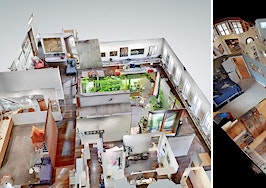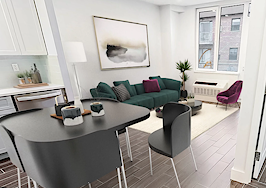GeoCV, a 3D imaging company that has positioned itself as the chief rival to market leader Matterport, is splitting up and reducing operations, with most of its staffers forming a Russian office for a spatial computing firm while its service offerings continue to run on autopilot, the company confirmed Wednesday.
In a statement, GeoCV said that the shift involves the “majority” of its team joining Occipital, a Silicon Valley-based company that will now open an office in Russia. At Occipital, the former GeoCV staffers will help launch a new research and development office in Moscow.

Geo CV co-founder and CEO Anton Yakubenko. Credit GeoCv
GeoCV co-founder and CEO Anton Yakubenko told Inman Wednesday that GeoCV’s engineering employees were already based in Russia, where his company was originally founded. Those are the staffers who are joining Occipital, and who will form that company’s new Russian office. GeoCV’s New York-based business employees, on the other hand, are currently focused on creating a smooth transition but will likely be “looking for new opportunities” in the near future.
A total of 18 employees will make the transition from GeoCV to Occipital.
Yakubenko, who co-founded GeoCV in 2014, is himself among those joining Occipital, where he will work as a vice president of product. He also told Inman that GeoCV and Occipital have “long lasting relationships,” with his company using the “Occipital Structure Sensor” in its scanners, and that the joining of the two companies’ resources is “not accidental.”
However despite the staffing moves, Occipital is not taking over the GeoCV’s flagship Virtual Open House product. Yakubenko said that the company’s software services will continue to run in a kind of “autopilot” mode, and that customers who have a GeoCV camera will still be able to shoot and upload virtual tours. But as of Oct. 8, GeoCV will no longer provide human support for customers and cameras will no longer be available for purchase.
In other words, the GeoCV name will live on for now, but as a kind of automated tech infrastructure that lacks an actual staff.
In preparation for the transition, GeoCV has created a number of articles and video tutorials to help users continue taking advantage of the system, Yakubenko said. He added that the experience for users should continue to be mostly the same for now.
Asked how long GeoCV’s system could continue to operate without a team of software engineers maintaining it, Yakubenko replied that it should run for the “foreseeable future.”
GeoCV’s newly announced operational changes come about a year after rival Matterport sued the company for infringing on 3D technology patents. Both Matterport and GeoCV offer three-dimensional and “dollhouse” views of homes that give real estate agents a more immersive way to market properties, and in the suit Matterport cited six different patents it said GeoCV violated.
Matterport was seeking both an injunction to stop GeoCV’s alleged infringement, as well as monetary damages. Matterport declined Wednesday to comment on GeoCV’s operational changes.
Yakubenko said Wednesday that GeoCV has been in talks with Matterport to find a resolution to the suit. Asked if the case prompted the newly announced changes to GeoCV’s operations, Yakubenko said that his company is a “venture-backed startup and it’s in the nature of all venture-backed startups to join larger companies.”
“The lawsuit from Matterport has only accelerated that,” Yakubenko added.
Yakubenko also indicated that the remaining pieces of GeoCV, namely its technology and intellectual property, could theoretically be acquired in the future as well.
“We are open to any reasonable options for the future of the remaining assets,” he explained.
The changes to GeoCV’s operations also come amid a time of increased disruption in the 3D imaging industry. GeoCV itself has been among those pushing the envelope, announcing in July for instance that it had launched a virtual staging partnership with BoxBrownie. As of Wednesday, BoxBrownie told Inman that it was still processing images for GeoCV clients.
But even as GeoCV worked to debut new products, other larger companies were creeping onto its turf. Most notably, Zillow rolled out its own version of 3D tour technology nationwide in April. And while some industry veterans questioned if the product was really three dimensional, it nevertheless represented a serious play into the space by a real estate behemoth.
Now, GeoCV is effectively stepping away from the race with companies like Matterport and Zillow. Yakubenko said that response from clients has been mixed, but overall more positive than he expected.
Yakubenko was also optimistic about moving to Occipital, which has a number of different products including an imaging sensor that can fit onto an iPhone.
“I definitely feel some excitement,” Yakubenko said, “about what the future holds and what we can do together with Occipital and GeoCV.”
Correction: Occipital is a U.S.-based company that will open a Russian office staffed by former GeoCV employees. This post originally described Occipital as a Russian company.






